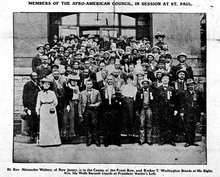William Henry Steward
William Henry Steward (July 26, 1847 – January 3, 1935) was a civil rights activist from Louisville, Kentucky.
He was a leader in Louisville civic and public life, and played a role in extending educational opportunities in the city to black children.
He was a lifelong opponent of segregation and was frequently involved in anti-Jim Crow law activities.
In 1914 he helped found a Louisville branch of the National Association for the Advancement of Colored People (NAACP), which he left in 1920 to become a key player in the Commission on Interracial Cooperation (CIC).
He was respected in this position and was elected to represent the state in the National Letter-Carrier's Association meeting in 1882 in Philadelphia.
He became well respected in the group, and was made Worshipful Master of United Lodge No 12, High Priest of Enterprise Chapter no.
[1] He was associated with public schools in Louisville and promoted their growth and development, particularly in securing appointments for African American teachers.
[2] In 1893, he opposed African American teacher William T. Peyton's attempt to gain the principalship of Central High School.
Steward felt that the Democrats were responsible for Jim Crow laws and much of the discrimination of blacks, and were opposed to Republican sponsored 13th, 14th and 15th Amendments increasing the civil rights of African Americans.
Steward shared the suspicion and opposed the club and its effort to discredit Louisville Mayor George Davidson Todd.
Steward gained Todd's ear, and had some influence over patronage appointments made by the mayor.
[1] He was a delegate to the 1892 Republican National Convention in Minneapolis, where he supported Benjamin Harrison,[7] who won the nomination but lost the election to Grover Cleveland.
His methods were generally moderate, seeking to further African American interests without offending his white supporters.
He was president of the council from 1904 to 1905, following Journalist Timothy Thomas Fortune and preceding Bishop Alexander Walters in that position.
[2] In November 1917, Steward worked with the NAACP and other black leaders in litigation which went to the US Supreme Court where Louisville's Residential Segregation Ordinance was overturned.
[10] In 1920, Steward and Parrish were ousted from the executive board of the branch due to pressure from businessman Wilson Lovett over a bond issue.
[12] He was buried alongside his wife, Mamie E. Lee Steward in Louisville's Eastern Cemetery.
